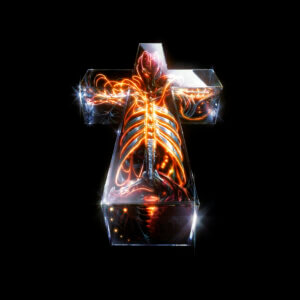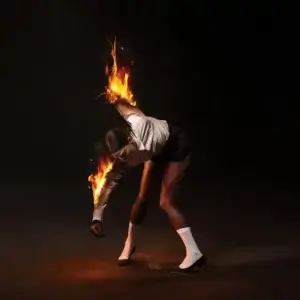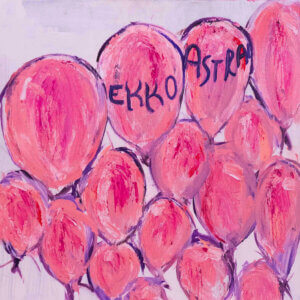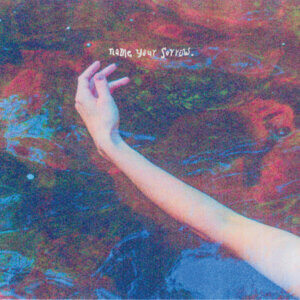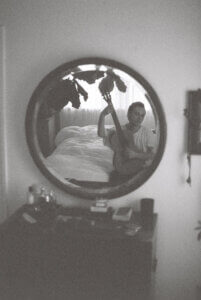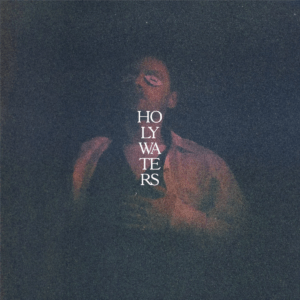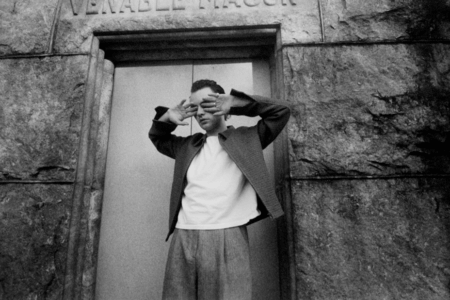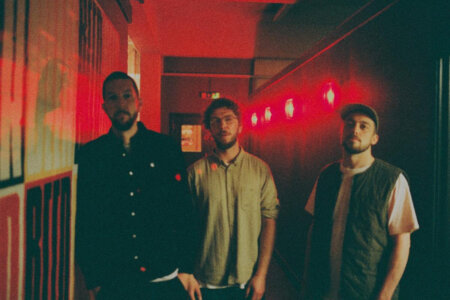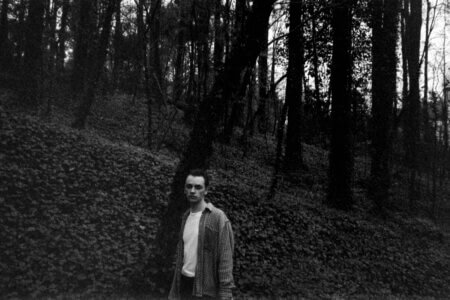Puma Blue Is Navigating The Waters
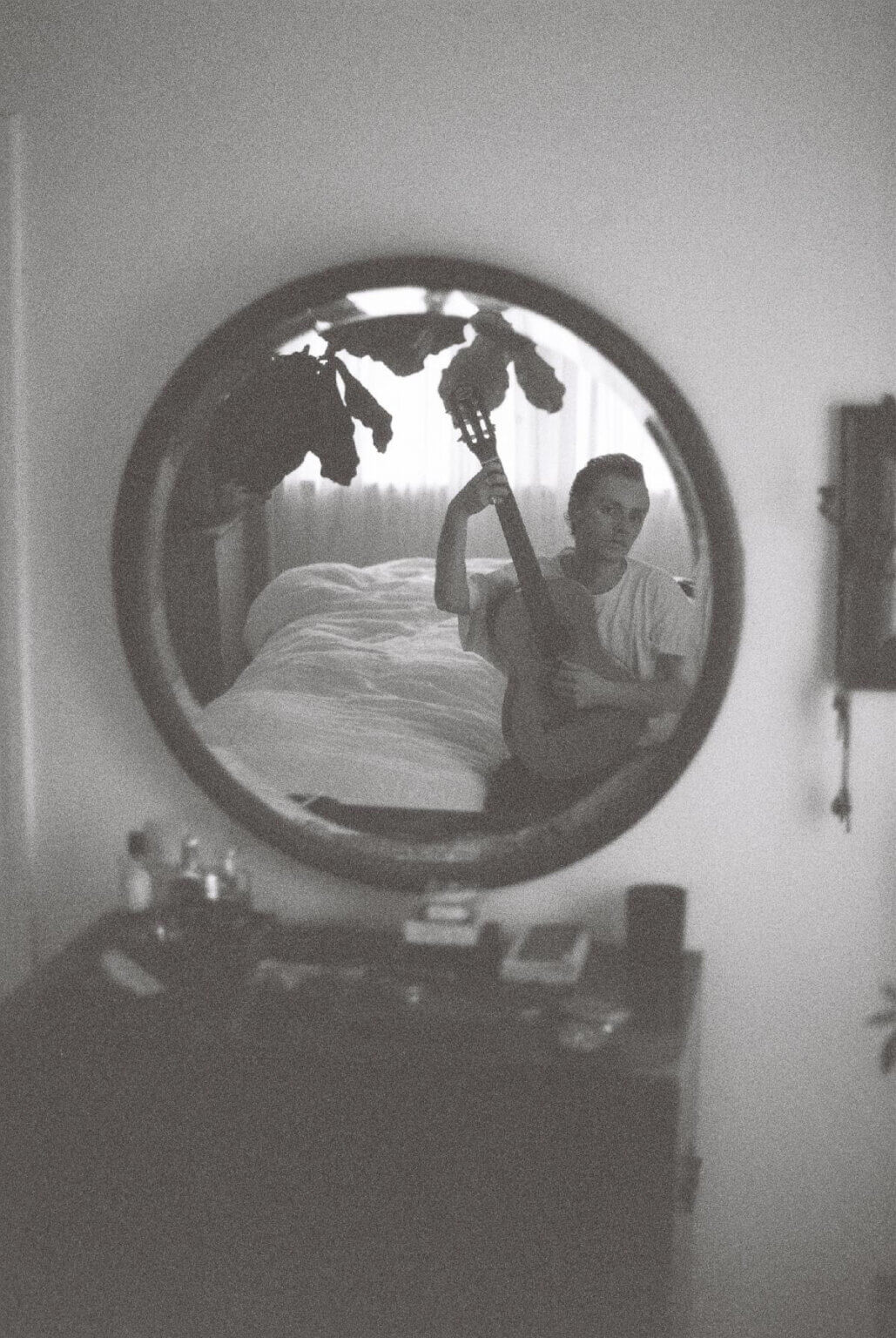
A lot has changed for Jacob Allen in the short space of time since releasing Puma Blue’s 2021 debut In Praise of Shadows, notably relocating from London to Atlanta. Along with getting used to new surroundings, Allen explored new creative avenues when approaching his second album. This period of discovery – external and internal – have culminated in a beautiful body of work that navigates grief in an eloquent and earnest way. The scope of Puma Blue’s arrangements are endlessly inviting and evocative, revealing new layers with each return. It also demonstrates great artistic growth, one that has been earned through the levels of self-examination evident in the excellent Holy Waters.
Allen spoke to Northern Transmissions about their forthcoming Puma Blue record, Holy Waters which will be released on September 1st via Blue Flowers. He tells us about how watching Get Back informed and inspired a new way to approach and utilize the studio, how he processed grief in his lyrics and the differences between the writing and recording of Puma Blue’s debut and this striking second record.
Northern Transmissions: You’ve been in Atlanta for around two years now, right? How’s it been going for you there?
Jacob Allen: It’s nice to be living somewhere a little warmer than England and a little cheaper than London. So yeah, it’s great. I love the people here, too. I find a lot of peace in my neighborhood, I’m able to connect to music a little bit deeper, just by being somewhere so quiet.
NT: Do you feel like you’ve integrated into the music community there since moving over?
JA: Honestly, not just yet. I just this week got invited to a jazz night that I’m really excited to go to, but everyone I know here seems to be doing other stuff outside of music. It’s been an interesting transition for me because it’s the first time I’ve ever lived somewhere where I don’t really have access to a music- based community. I think, especially because when I arrived here the pandemic was still ongoing and this is the first year where it’s been a bit more social and I’ve mostly been working and working in London.
I’d really love to plug in a bit more here but, bizarrely, I just haven’t met many musicians yet.
NT: I’ve been really enjoying listening to your new album, Holy Waters. It’s been really muggy but quite dull weather-wise in Dublin, Ireland, so it’s been a nice album to get stuck into because it’s so soothing and nocturnal. It’s really suited the external factors I’ve had whilst listening!
JA: Thanks! I know you mean that as a compliment, and I’ll take it as a compliment, but it’s just so funny because I think that was something I was really trying to get away from when I was a bit younger, like after the EPs, I was like ‘I gotta make music that’s not so kind of murky and miserable’ and we ended up recording this album on the coast. I don’t know if you’ve ever been to Eastbourne, but it’s just a muggy, gray, windy, rainy, wet place, and I think it was just kind of inevitable that it ended up bleeding into the music, you know. But I’m glad that it’s bringing you comfort!
NT: Tell me how was it for you working on this album compared to In Praise of Shadows, which was made during the depths of lockdown and was then well received by critics and fans. I suppose with album two, there’s perhaps a different type of pressure an artist can feel, especially when you want to create a body of work that will connect with people again but also present an opportunity for you to challenge yourself during the writing and recording process. How did you find the experience of making album two?
JA: It was really bizarre. I didn’t really feel like the first album was a success, to be honest. I don’t think it bombed or anything but it was really hard to get people to listen to it. During the pandemic I just felt like we couldn’t tour and I don’t know if I really delivered the album that I wanted to deliver. Don’t get me wrong, I love the songs and the journey that it ended up being as a listen.
I think there’s something really cool about the EPs I did before, because they’re so lo-fi and there was naivety to them. The new record was the opposite of that, it was a bit more confident. But the first album was kind of stuck in limbo. I think between coming to terms with putting out a body of work and trying to make something that sounded confident, but also not necessarily having the skills to deliver on that. So, I felt a lack of pressure from the outside with this record. I didn’t feel like, ‘Oh my God, I’ve had a hit and I’ve gotta like, deliver another one’. Instead, I had this weird feeling of like, ‘Shit, well, I don’t feel like that album did as well as I dreamed that it would, and that’s okay, because now I can kind of just continue on’. It was sort of like the universe’s way of urging me to continue making the music I want to make and not worry about how it’s going to be received because you could make something incredible that you’re really proud of, and no one would hear. Or you could make a pop record that would blow-up overnight but is that even really what you want?
I just had to come back to music as a form of play and find the fun in it again. I think the biggest challenge was the pressure I was putting on myself as a writer. I had about a year after the first album where I didn’t write anything that I liked and I was just very stuck. The way I got through that was that I realized that I was being too serious. I was sitting with either a guitar or a Logic session open or a notebook and just furiously trying to come up with something like a mad professor. At the end of 2021, I realized that I wasn’t having fun and that’s why I wanted to do music in the first place; because it feeds me and it brings me joy.
I struggled to write the second album at first, but once I got over that block, it just came flowing incredibly quickly. There are actually a lot of other songs that didn’t end up making the album, which probably could have, but it was really fun to boil it down to the essentials.
NT: That’s so fascinating, particularly what you’re saying about simply having fun with making music. I was reading that elements of songs, “Hounds”, for example, were recorded in one take. Was that part of the process of making things feel fresh and exciting?
JA: We recorded a few takes to get the right one. But the tape we used was not a comp like it’s just a flowing tape from beginning to end, without any kind of edits. So, we didn’t nail it in one take. I think we did maybe three or four takes. I think something I’ve done before is a lot of cutting and pasting; finding the bits that I think are the best and compiling them together and there’s absolutely nothing wrong with that at all, but there was something to the energy of this album that felt a bit more… because I was involving the band more and it was created a bit more live and less. filling in little chunks around my production.
It was less choosing which are the best bits or finding where we nailed the accuracy and more like ‘Okay, we’ve got three takes, and they’re all different vibes, completely different and would really change the song depending on which one we choose. Which one do I connect with the most?’ So maybe there are tunes on the album where we actually played it better on other takes, but I just didn’t emotionally connect as much with the one where maybe there was some, like, raw little mistakes or some someone in the band wanted to have done their part a little bit better. But it didn’t matter to me because that was the feeling I was trying to capture.
With something like “Hounds”, I just knew as soon as we played the last note and the note had died out, we looked over to the engineer for him to press stop, I just kind of turned to everyone and was like, ‘That was it’. You just get the feeling about it.
NT: I was curious to hear how you approached the instrumentation and developing the arrangements, especially with the song “Gates (Wait For Me)” from Holy Waters. That’s such a commanding and extraordinary centrepiece to the album; it’s so incredibly vast and expressive and enveloping. It also sounds like you’re performing it in an empty church and transports the listener to a similar space. Can you tell me about the writing and recording of that song. And how you felt listening to it for the first time?
JA: I think that was the quickest song to be written on the album. There were a lot of things I had pre-written and brought to the sessions with the band, showing them my demos. Usually, I would finish those by myself but this time, I wanted to really involve the band and flip some of the demos around. Through that process, we ended up writing a lot of stuff on the fly together. That was one of those songs where, while someone was chatting, I started playing these chords and then Harvey, who plays keys and sax in the band, started playing along with me.
I can’t remember who said it, but I heard someone say once, sometimes the key to finishing a song is to kind of will it into existence. You know, most of the things you could pick up and start playing, you could equally just put down and decide they’re not worth pursuing. But I was playing these chords round and round and it just felt like this strangely perfectly loop. I looked over to the rest of the guys and said softly to play. Within half an hour, we’d figured out the song. It was just one of those things, it repeats a lot for the first half and the second half is just improvised. So, in a way it’s very simple, even though it doesn’t sound that way. And I think, because we were just building into this crescendo moment, that’s where that kind of vastness comes from it. It was very natural, you know. It starts off quiet and ends up big, it just kind of gives the impression of being really huge, even though we were playing in a studio and not a church!
That song was a really fun one to make because it was just pure expression. Everyone had their eyes closed and completely in the moment. I think that’s probably one of my favorite things we’ve ever recorded because the feeling of playing it was so exciting. And everyone was just bouncing off of each other. I kind of can’t believe we have that recording, we only recorded that one twice. That one actually is actually the first take. It’s like having a photograph of a really special moment, but sonically! It was really special to have the sound of us playing together, but then what I had to do, months later, I muted the demo vocal and resung it while I was mixing the album, so it was a while before I had it finished.
I did get really emotional hearing it back.There’s so much love that went into this album, more than anything I’ve done before. When I would hear the finished recordings, it was quite moving to me because the words found me almost like a target. As if I was the audience rather than the artist. I’ve never really had that where I’ve felt so outside the music once it’s finished. There’s usually always something I could pick apart and critique. But this time, I think, and especially with a song like “Gates (Wait For Me)”, I felt very moved by the bands playing and the message as well. That was a special one, it’s interesting for you to bring up.
NT: I was interested to read that your new album deals with themes such as death and grief. You had a lovely line about it being “a chronicle of the graciousness within each repeated cycle of life, death and rebirth” When you were writing the album was there a particular line that perhaps tumbled out of you as you were processing different experiences that, when you hear it today still holds a certain kind of weight to it?
JA: That’s a really interesting question. It’s pretty hard to choose one. I feel like I’m usually stumped and I’d be racking my brains to choose an interesting lyric. But I feel like with this album, maybe because of the subject matter, that a lot of the lines have stuck with me or felt important, in retrospect. The one that’s really ringing around my head right now is from the song “Epitaph”, which is about my grandmother who passed away a couple of years ago. It’s the line, “Through all of these things you can live on”.
I don’t think it’s my best lyric, it’s not the most poetic or anything. But the whole song tumbled out around that line. As soon as I found that phrase, the blanks filled themselves in and I had three verse that I’m very proud of that really reflect my memory of her pretty perfectly in a way that I wasn’t able to articulate before. I could never have come up with something like that had I spoken at her funeral or if someone had asked me, on the fly, what’s your memory of your grandma?
I was thinking about how she is living-on currently; in what ways does she still feel alive to me? All these like very visceral sensations ran to the surface and I found myself being able to just describe for pages some of those things. That’s my favorite line, because of how I just described the process and how easy it became to write but I think also because I guess the message of the album being that death is really rough but it’s also a natural part of life. I feel like that line is the truest line to what I was trying to say. It sums up how I was feeling about death.
NT: Even though you say it’s not your most poetic line, I think it’s a very human sentiment and has so much comfort in it. With grief, you can have really visceral experiences, like you could be walking down the street and there could be someone wearing her perfume and immediately make you think of her.
JA: I have that all the time with her. I don’t know if it’s just her posture or she had this very thin little frame, like a bird or something, and every now and again, I think I see her hair or her silhouette across the street. Of course, it’s never her and that’s what the song “Mirage” is about, except not about my grandma. “Mirage” describes the negative side of that sensation, but “Epitaph”, and I hadn’t thought about how these songs were connected before, is the good part of that sensation. Like you said, it’s the comfort that it brings.
NT: You watched Get Back which provided some inspiration. Did that get you excited with the band dynamic when you were in the studio? Did you have moments where your eyes were opened to how The Beatles approached songwriting in the studio?
JA: Oh, that’s really interesting. It was just the demystifying of The Beatles for me that I really loved watching. I just always imagined them as kind of mustache-stroking geniuses, I kind of think the same about Pink Floyd. They go into their studio, they lock the doors and then three weeks later they come out with a mysterious masterpiece, right? I think it was so refreshing to see these young guys – like younger than I am now, which is the really freaky thing – just seeing them piss around and waste time with arguments, which luckily we don’t have in our band dynamic. But there was a moment where Paul McCartney is playing “Get Back” for the first time, before it became a song and he’s messing around with it and Ringo is yawning and the other guys aren’t paying attention. It’s a mess and honestly what Paul’s playing isn’t great and if I was playing that I’d throw it away but that’s one of their biggest songs. I think that was a lesson for me, like I was saying earlier, in play. The idea of following things through and allowing for mistakes and not starting to write a line or starting to come up with the song and throwing it away because it’s not good enough. Allowingmthings to blossom. You know, maybe you’re the one that sparks the song, but maybe someone elsemmakes the song feel good or to finish it.
Like the song “Too Much” on my album, Harvey just started playing this thing on a synth and knowing him, he probably would have just forgotten about it and thrown it away. But I really tuned into it and was like, ‘What are you doing? I love that!’ and a whole song was born. I think because I have written and produced alone so much, watching that film for me was just inspiring to see a band working like that when we do that all the time in rehearsals; we’re always mucking around. And so, I began to think about what if we did it with the intention of writing in a studio where we could record what we were doing. That was very inspiring to me.
NT: Finally, what are you most looking forward to with Holy Waters coming out and for people to be able to listen to it?
JA: I think this is the first time I’ve realized my potential, which sounds pretentious and I don’t want it to come across as cocky, because I’m not saying this album is perfect or anything like that, but I feel like even from the first EP, I felt like I could do something like this album. I had the ambition but I just wasn’t there yet. It took a lot of experience and time to get to this place and like I said before, I don’t know if I really felt like I’d unlocked the potential on the last record. This is the first time where I feel like everything’s firing on all cylinders. I’m really proud of the songwriting and of my voice for the first time. I love listening back to the band and what they brought to it. I’m proud of my production. It’s kind of the first time that it’s truly one foot in the boat of lo-fi and one foot in a boat of hi-fi.
I’m excited for people who are already fans to hear it because I think they’ll like it. You know, I have no idea if the album will do well and reach further people. But, I feel like if you’ve already been a fan I’m excited because I think it’s probably what people have wanted from me for a while. Which is funny, because I didn’t intend to make an album that the fans would like, at all. I wasn’t thinking about that. I usually feel like if I like it then the fans will. I think with this one, as well, I’m just so excited about it because I had so much fun making it and it’s been such a pleasure finishing it.
So yeah, I think I’m most excited for people to get into it, go on a journey with it, and hopefully experience an emotional reaction to it. That’s all I could really hope for.
Pre-order Holy Waters by Puma Blue HERE
Words by Zara Hedderman
Latest Reviews
Tracks
Advertisement
Looking for something new to listen to?
Sign up to our all-new newsletter for top-notch reviews, news, videos and playlists.
